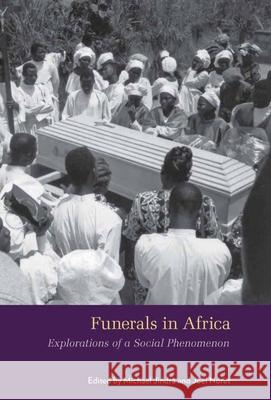Funerals in Africa: Explorations of a Social Phenomenon » książka
Funerals in Africa: Explorations of a Social Phenomenon
ISBN-13: 9781782381280 / Angielski / Miękka / 2013 / 244 str.
Funerals in Africa: Explorations of a Social Phenomenon
ISBN-13: 9781782381280 / Angielski / Miękka / 2013 / 244 str.
(netto: 130,37 VAT: 5%)
Najniższa cena z 30 dni: 135,22
ok. 30 dni roboczych.
Darmowa dostawa!
Across Africa, funerals and events remembering the dead have become larger and even more numerous over the years. Whereas in the West death is normally a private and family affair, in Africa funerals are often the central life cycle event, unparalleled in cost and importance, for which families harness vast amounts of resources to host lavish events for multitudes of people with ramifications well beyond the event. Though officials may try to regulate them, the popularity of these events often makes such efforts fruitless, and the elites themselves spend tremendously on funerals. This volume brings together scholars who have conducted research on funerary events across sub-Saharan Africa. The contributions offer an in-depth understanding of the broad changes and underlying causes in African societies over the years, such as changes in religious beliefs, social structure, urbanization, and technological changes and health. Michael Jindra is an Adjunct Associate Professor in the Department of Anthropology and a visiting research scholar in the Center for the Study of Religion and Society at the University of Notre Dame. He has published in journals such as Africa, Sociology of Religion, Anthropological Forum, and Society and has also contributed chapters to a number of books. His current research focuses on the connection between lifestyle diversity, culture, and inequality in the US. Joel Noret is Assistant Professor of anthropology at the Universite libre de Bruxelles, Belgium. He has been conducting fieldwork in southern Benin since the beginning of the 2000s. His publications include the co-edited special issue of Gradhiva, Memoire de l'esclavage au Benin (with Gaetano Ciarcia, 2008), his monograph, Deuil et funerailles dans le Benin meridional. Enterrer a tout prix (Brussels, 2010), and Mort et dynamiques sociales au Katanga (with Pierre Petit, Tervuren-Paris, 2011).
Across Africa, funerals and events remembering the dead have become larger and even more numerous over the years. Whereas in the West death is normally a private and family affair, in Africa funerals are often the central life cycle event, unparalleled in cost and importance, for which families harness vast amounts of resources to host lavish events for multitudes of people with ramifications well beyond the event. Though officials may try to regulate them, the popularity of these events often makes such efforts fruitless, and the elites themselves spend tremendously on funerals. This volume brings together scholars who have conducted research on funerary events across sub-Saharan Africa. The contributions offer an in-depth understanding of the broad changes and underlying causes in African societies over the years, such as changes in religious beliefs, social structure, urbanization, and technological changes and health.Michael Jindra is an Adjunct Associate Professor in the Department of Anthropology and a visiting research scholar in the Center for the Study of Religion and Society at the University of Notre Dame. He has published in journals such as Africa, Sociology of Religion, Anthropological Forum, and Society and has also contributed chapters to a number of books. His current research focuses on the connection between lifestyle diversity, culture, and inequality in the US.Joël Noret is Assistant Professor of anthropology at the Université libre de Bruxelles, Belgium. He has been conducting fieldwork in southern Benin since the beginning of the 2000s. His publications include the co-edited special issue of Gradhiva, Mémoire de lesclavage au Bénin (with Gaetano Ciarcia, 2008), his monograph, Deuil et funérailles dans le Bénin méridional. Enterrer à tout prix (Brussels, 2010), and Mort et dynamiques sociales au Katanga (with Pierre Petit, Tervuren-Paris, 2011).











